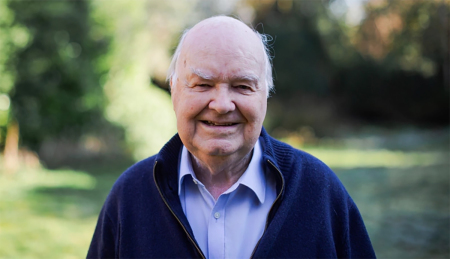Apologist John Lennox confronts atheist Richard Dawkins on suffering

Christian apologist and math academic professor John Lennox has challenged the views of evolutionary biologist Richard Dawkins on the issue of ultimate justice.
The two academics have debated in person before, but Lennox quoted Dawkins when addressing the issue of suffering, in his latest email circular as president of the Oxford Centre for Christian Apologetics (OCCA).
The Dawkins quotation referenced by Lennox came from the atheist’s book, River Out of Eden: A Darwinian View of Life: “In a universe of blind physical forces and genetic replication, some people are going to get hurt, other people are going to get lucky, and you won’t find any rhyme or reason in it, nor any justice. The universe that we observe has precisely the properties we should expect if there is, at bottom, no design, no purpose, no evil, no good, nothing but pitiless indifference. DNA neither knows nor cares. DNA just is. And we dance to its music.”
Lennox wrote in response that he found himself to be a moral being and his heart cried out for justice.
“Atheism might seem to offer a solution by removing God from the equation, but in doing so, it removes all hope,” wrote Lennox. “Without God, there is no ultimate justice, no life beyond death. Atheism is a hopeless faith.”
Lennox said he had visited the Nazi concentration camp Auschwitz many times “and each time I’ve wept.” He understood why people become atheists in the face of such suffering. He also concurred that the issue of suffering itself is complicated.
The Oxford apologist further said that a cross lay at the heart of Christianity and with it came “suffering and extreme pain.”
“It may be difficult to accept,” he added, “but the Christian claim is that the person on the cross was God incarnate.”
Lennox queried what God was doing on a cross and opined that it showed the Lord was not distant from our suffering.
“Instead, he has entered into it, becoming a part of it through Jesus Christ, but that’s not the final step. Beyond the suffering of the cross, there is hope. The resurrection of Jesus means that death is not the end. That changes everything.”
A personal and poignant illustration was used by Lennox to underline his point. His 22-year-old niece died from a brain tumor not long after marrying a youth pastor. Lennox recalled the experience of “profound suffering” for his family but acknowledged, “she held onto her faith in Christ.” The reason being that Jesus “brings hope.”
“He doesn’t guarantee a release from the physical process of death,” added Lennox, “but what He does guarantee is a salvation that transcends pandemics, transcends brain tumors, transcends death.
"Now atheism can’t offer anything like that.”
Originally published at Christian Daily International
Christian Daily International provides biblical, factual and personal news, stories and perspectives from every region, focusing on religious freedom, holistic mission and other issues relevant for the global Church today.





















